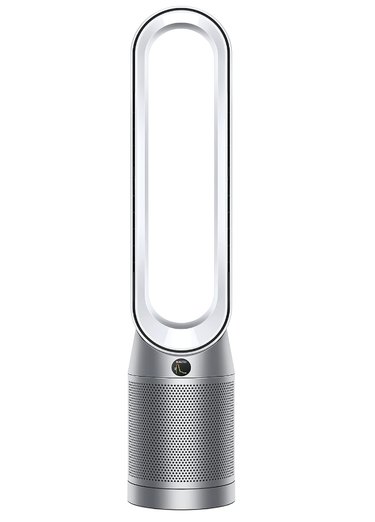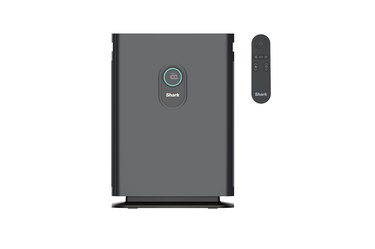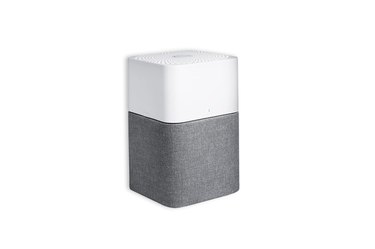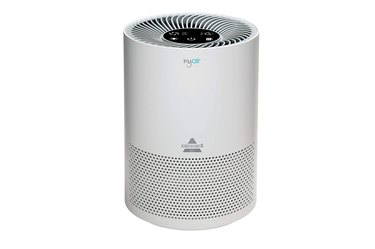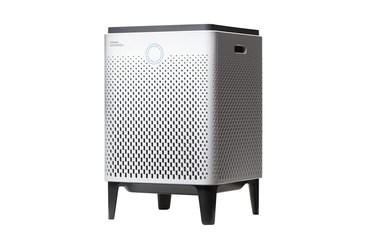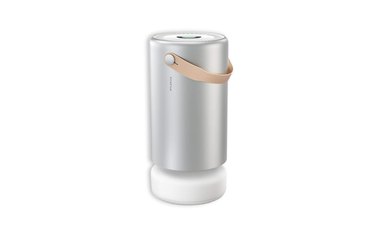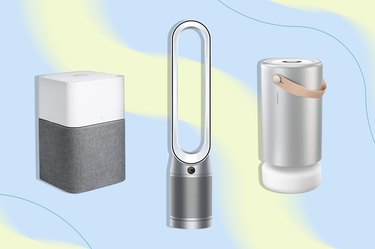
We spend endless hours in our homes, and yet, some particles and pollutants we're breathing in could be damaging to our health. Air purifiers are helpful at cleaning the air for everyone, and are especially important for people who have certain medical conditions or deal with allergies to mold, dust and other irritants.
Dr. Steven Goudy, MD, FACS, a pediatric ear, nose and throat specialist, explains that the upper and lower respiratory tract's function is to clean and purify the air we breathe. "Purifying the air that you breathe is important if you [have]... an underlying condition that makes you more sensitive to air pollutants, like asthma," he says.
Video of the Day
Video of the Day
If you live in an area prone to wildfire (and thus, smoke) or your home is older and creates more dust, an air purifier might be helpful. "Reducing the burden of allergens or irritants that your or your loved one breathe will reduce the reactivity of your upper and lower airways and lead to better sleep and health," Dr. Goudy says.
The Best Air Purifiers
- Best for Allergies: Dyson Purifier Cool TP07: Smart Air Purifier and Fan ($649, Amazon)
- Best for Mold and Dust: Shark HE402 Air Purifier 4 True HEPA ($289.99, Amazon)
- Best for Pets: BlueairAir Purifier, Blue 211+ ($288.99, Amazon)
- Best for Smoke: Bissell MYair Air Purifier with High Efficiency and Carbon Filter ($72.90, Amazon)
- Best for Large Rooms: Coway Airmega 400 Smart Air Purifier: True HEPA Air Purifier with Smart Technology ($507.24, Amazon)
- Best for Viruses: Molekule Air Pro FDA-Cleared Medical Air Purifier with PECO Technology ($634.99, Amazon)
How We Chose
We discussed the essential elements of an effective air purifier with Dr. Goudy to select the top contenders for each category. We used these criteria to guide our review process:
- Size of space
- Air quality goal and purpose
- Ease of cleaning/replace the filter
- Reviews
For more information on how we choose and cover products, click here.
1. Best for Allergies: Dyson Purifier Cool TP07: Smart Air Purifier and Fan
Pros
- Turns on automatically as needed
- Doubles as a fan
- Provides insights via an app
Cons
- Pricier option
Whether spring or fall, allergy sufferers always know when a new season is approaching. Their nose becomes stuffed and runny, their eyes turn red and watery, and overall, they feel foggy and uncomfortable. To ease your symptoms inside, an air purifier designed for allergies can be beneficial.
Though it's on the pricier side, this highly rated top seller from Dyson not only delivers 50 percent cleaner air but includes a HEPA-certified filter that removes 99.97 percent of particles .3 microns in size. In other words: It will clean even the tiniest of allergen. The air purifier automatically reacts when a new unwanted source enters the air, turning on and off to clean as needed.
Another bonus of this Dyson model is that it is dual-purpose, also working as a fan, with 0 to 350-degree oscillation and a backward airflow that can purify without cooling. If you crave data, download the Dyson app for more information on the oxygen that surrounds you all day, every day.
Buy it: Amazon; Price: $649
2. Best for Mold: Shark HE402 Air Purifier 4 True HEPA
Pros
- HEPA filter
- Quiet
Cons
- Does not have an app
An air purifier will not remove the contamination if you have active mold growing in your home. However, if you are worried about mold forming, you can work to remove airborne mold spores. The key is to ensure you choose a highly-rated air purifier with a true HEPA filter, like this top pick from Shark.
How does it work? The filter will trap all those mold spores that unknowingly float in the air — specifically in typically moisture-rich areas like kitchens, bathrooms and basements. This air purifier features four high-speed fans, but you wouldn't know it since it's very quiet and won't disturb your sleep.
If you want to know the air quality in your home, the control panel displays it in real-time. In addition to the HEPA filter, there is an additional layer of odor protection, too.
Buy it: Amazon; Price: $289.99
3. Best for Pets: Blueair Air Purifier, Blue 211+
Pros
- Has a washable pre-filter
- Handily traps animal hair
Cons
- Requires upkeep
A big reason why many people decide to invest in an air purifier is for their four-legged best friend. Dogs and cats are wonderful companions, but they also come with fur, hair and dander. Some people are allergic to pet dander, and one way to cut back on the amount that's seeping into the air is with a purifier designed for animal lovers.
Dr. Goudy chooses this purifier from Blueair because it features a washable pre-filter. "It can trap the pet hair and reduce your costs of replacing the filter itself," he says. "Like anything in your home, these devices require attention and maintenance, so be aware that the expense and upkeep can cost up to $140 per year."
Buy it: Amazon; Price: $288.99
4. Best for Smoke: Bissell MYair Air Purifier With High Efficiency and Carbon Filter
Pros
- Multi-layered filtration
- Budget-friendly
- Covers up to 1,000 feet
Cons
- High setting is noisy
- Doesn't have HEPA filter
If you cook up a storm in your apartment or home, but there is very little ventilation for your stir-fry night, you may feel like the smoke settles in the air for a long time. Or, if you live in an area that's prone to wildfires, like some regions of California, Oregon and the Western U.S., you'll want to have an air purifier that works against smoke.
Dr. Goudy recommends air purifiers from Bissell, and this one captures indoor smoke, as well as outdoor smoke that sneaks inside. It features three layers of filtration, with the first one fighting against carbon, gas and smoke odors. The second layer is medical-grade and battles pollen, pet dander, dust and smoke particles. And the last, the pre-filter layer, combats hair, fiber, lint and pet fur.
This super-quiet model has two fan speeds and can cover up to 1,000 square feet.
Buy it: Amazon; Price: $72.90
5. Best for Large Rooms: Coway Airmega 400 Smart Air Purifier: True HEPA Air Purifier with Smart Technology
Pros
- Suitable for large spaces
- Has HEPA filter
- At-a-glance air quality monitor
Cons
- No nighttime mode for lights on machine
If you want to purify the air in a large space — say an oversized basement or a lofted space — take a look at the coverage space. For big areas, this Coway Airmega 400 can purify up to 1,500 square feet at least two times per hour.
It features a true HEPA filter that captures 99.9 percent of particles sized even as small as .01 microns. A fun feature is the ability to glance at this air purifier and know your air quality: an LED ring that turns various colors lets you know if your indoor oxygen is clean or dirty immediately.
It has five fan modes, including low, medium, high, sleep and smart. When it's on "smart" mode, you can leave it and forget it since it will turn on and off as needed to cleanse your space.
Buy it: Amazon; Price: $507.24
6. Best for Viruses: Molekule Air Pro FDA-Cleared Medical Air Purifier with PECO Technology
Pros
- Portable design
- Quiet
- Traps viruses, allergens and irritants
Cons
- Some people have difficulty connecting to WiFi
Along with other ways to prevent getting viruses like COVID-19 or the flu (like wearing a mask or self isolation), an air purifier can also help clean the air from a virus.
Dr. Goudy recommends this FDA-cleared medical air purifier with unique technology. "It uses free radical generation to destroy/trap viruses — including COVID-19 — as well as allergens and irritants," he says.
A benefit of this air purifier is that it's portable, so you can move it with you, thus reducing the need for multiple units. The filter will work for up to six months, and you can choose between two auto-protect modes: standard or quiet. (There are six manual modes if you choose, too.)
You can choose your settings on the touch-screen interface or connect to WiFi and control the air purifier from a distance with an app.
Buy it: Amazon; Price: $634.99
What to Look for in an Air Purifier
1. The Purpose and Goal
The air purifier that works in a house full of golden retrievers isn't what's necessary for a small office space inside your apartment. Or, the air purifier you use when you have severe allergies might not be the same one you choose for a slight dust sensitivity.
As Neeta Ogden, MD, the medical advisor for Curex says, you may seek air filters and purifiers that are more capable of filtering out microbes and viruses. "Not all air purifiers can filter out the small size of microbes and viruses," she says.
2. The Filter
There are many inexpensive brands to consider if you need a general air purifier for dust and particles, Dr. Goudy says. And many purifiers have replaceable filters that have activated carbon to trap particles, which is an additional cost.
Generally speaking, Dr. Ogden says people should look for HEPA-certified air purifiers, which are most efficient in removing allergens from the air. However, in some cases, there are air purifiers that might not be HEPA-certified but are FDA-approved and recommended for some health needs.
Keep in mind that if you have a home air purifier in your HVAC system, ensure that the minimum efficiency reporting value (MERV) rating is right for your home. "Filters with higher MERV ratings trap small particles more effectively than filters with lower MERV ratings, and the range for home HVAC filters is usually 1-16," Dr. Ogden says.
3. Your Space
The area of space you want to purify will also inform your decision, Dr. Goudy says.
As you can likely guess, the bigger the space, the larger the purifier you need (or you can get two smaller ones). A good place to get started and test your purifier is in your bedroom because it's where you spend the most time daily (hopefully 7 to 8 hours at night).
"Most purifiers specify the space of the room that they cover; but, I would recommend starting with smaller ones placed just in the areas you spend the most time, as there are many other strategies to mitigate your response to allergens or irritants," Dr. Goudy says.
Is this an emergency? If you are experiencing serious medical symptoms, please see the National Library of Medicine’s list of signs you need emergency medical attention or call 911.
